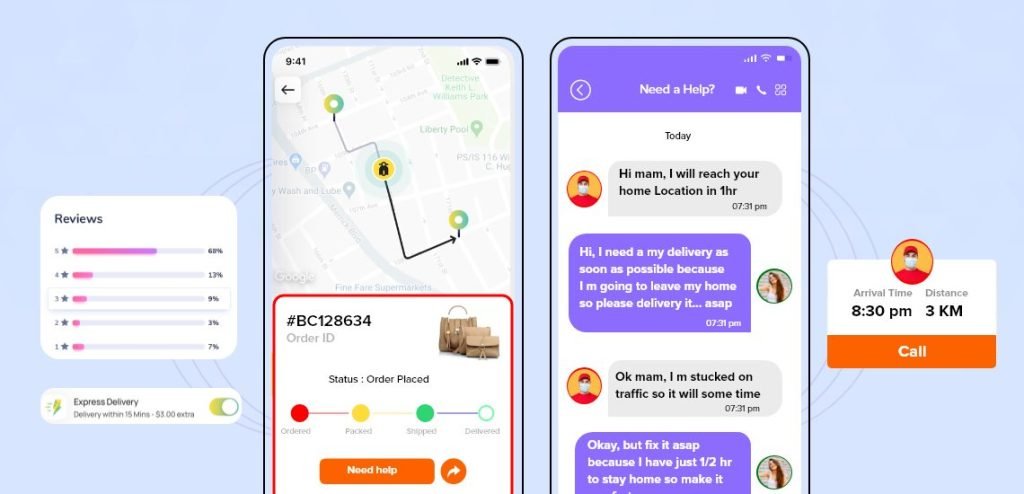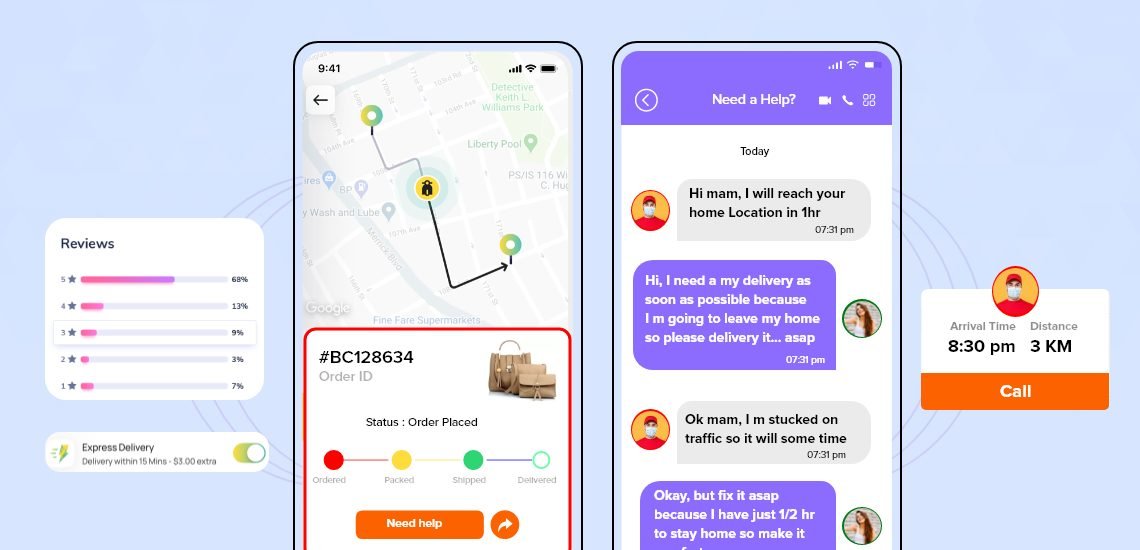In-app chats are the core of any type of business nowadays. Organizations use in-app messaging APIs and in-app messaging SDKs to not just be relevant but also boost their business. Communication APIs are looked at as a marketing practice that allows businesses to provide enhanced customer experience and increase engagement. Using instant messaging APIs helps businesses keep customers updated about any features or offer feature updates. Overall, such practices result in customer retention and growth for the business.
If you are also interested in understanding how to make use of app messaging APIs and in-app messaging SDKs for your business, then keep reading!
What are In-App Messaging APIs?
In-app messaging APIs are development tools that integrate seamlessly into your app, enabling you to send targeted messages to users. These messages can take various formats, including text, images, videos, and even interactive elements.
Key Features of In-App Messaging APIs
- Targeted Messaging: Reach the right users at the right time with messages personalized based on demographics, location, purchase history, and in-app behavior.
- Rich Media: Captivate users with engaging content like images, videos, and GIFs to enhance your message impact.
- Personalization: Craft unique messages for each user, creating a more personal and relevant experience.
- Segmentation: Group users based on specific criteria and tailor messaging campaigns for maximum effectiveness.
- Analytics & Reporting: Track the performance of your in-app messages, including click-through rates, conversions, and user engagement metrics.
How In-App Messaging APIs Benefit Your Business
In-app messaging APIs offer a multitude of benefits for businesses:
- Improved User Engagement: Proactively engage users with relevant information and updates, keeping them coming back for more.
- Enhanced Customer Support: Provide real-time customer support directly within the app, resolving issues quickly and efficiently.
- Increased Conversions: Drive users towards desired actions, such as completing purchases, signing up for trials, or referring friends.
- Boosted Customer Retention: Build stronger relationships with users by fostering ongoing communication and valuable interactions.
Examples of In-App Messaging in Action
- E-commerce App: Use in-app messages to trigger personalized product recommendations based on a user’s browsing history.
- Travel App: Send timely updates about flight changes or boarding gate information directly to the user’s app.
- On-demand Service App: Offer real-time support to users through in-app chat functionality.
In this article, we have discussed the 6 simple ways your business can make use of in-app chats.

1. Welcome New Users / Easy Onboarding Process
A report states that more than 75% of users who download an app don’t use it more than once. Businesses have only one shot to impress new users and convince them to keep using the app. Hence, using in-app chat to welcome new users, showcase key features, encourage the first conversation and offer a tour of the app or product as an onboarding – make a perfect first impression and boost activation rates. Moreover, with in-app chat for mobile apps, users can expect more instant and personalized onboarding messages that quickly help them through the onboarding process. For example – SLACK the workplace management tool welcomes users with in-app messages showcasing the platform’s best features.
2. Request Customer Feedback
Digital communication APIs can be used to request feedback from active customers. Through these businesses can identify troubles faced by the users and assist them at the moment. Instant messaging API allows you as a business to get immediate feedback at scale. Integrating in-app messaging APIs are also a great way to get customer feedback on how they are using the app or feedback related to the product/ service. Businesses can set parameters or plan scheduled triggers for the users to submit their feedback. For example, users after a certain period of using the app or frequent users can ask for feedback. Also, businesses can encourage customers to give continuous feedback by building feedback channels into the app experience.
3. Broadcast Updates & Features
Broadcasting updates, features, and product-related announcements are very important because they ensure customer retention. Using in-app messaging SDKs, businesses can create awareness for users to know about updates as well as help them learn how to make use of them. Nonetheless, updates should make users aware of new features and fixes that they may be anticipating rather than being interrupted. Thus, businesses must choose wisely on what updates should be notified through instant messaging APIs.
4. Offer Rewards & Celebrate Milestones
Offer rewards and celebrate milestones to encourage active users and keep them engaged with the use of digital communication APIs. Offering rewards on purchases, rewarding milestones, or even celebrating the anniversary of when they first downloaded and signed up for the app/product or service helps businesses. Businesses can show appreciation through in-app chats, build trust, and further engage users. Celebrating milestones creates a personal approach for the users and they keep returning to obtain more perks. These returning users are tremendously valuable as they can be easily converted to committed users of the app, product or service offered.
5. Upselling, Cross-Selling & Referrals
Businesses can use in-app messaging APIs to upsell their products, cross-sell supplementary brands/products as well as gain referrals. For example, the app Insight Timer uses in-app messaging SDKs to upsell services or upgrade users to Member Plus programs. Likewise, another example is the Spotify app that triggers in-app chats when free users try to skip too many songs and try to upsell the premium version. Moreover, businesses must drive user referrals by sending contextual messages. Referral programs will act as a stimulus and hence more users/customers can be added, ultimately resulting in the growth of the business.
6. Announce What’s New: Products & Offers
Affiliating with a top celebrity for a new campaign? Launching a new product? Offering incentives and discounts to users? Whatever the reason, businesses can use in-app messages to deliver announcements. Businesses now and then need to announce what’s new. Avoid mentioning such announcements on blogs or low-intent pages, and rather prefer communicating about such buzz-worthy events through in-app chats. Intimating users in such a manner promotes engagement and customer retention.
7. Top In-App Messaging Providers
There are plenty of in-app chat providers in the market, but the best in-app messaging API provider is someone who allows marketers to engage users at the right time. In-app chat providers need to facilitate onboarding, share product updates, and offer support at all times. Third-party in-app messaging API providers offer a productive way to boost traction with the most engaged users. Also, with the help of in-app chat providers, businesses can leverage both web and mobile applications and have a cohesive onboarding process, offer support, and strengthen marketing.
Here Are the Best In-app messaging API Providers of 2022
1. CONTUS MirrorFly – in-app messaging API offers seamless customization with plenty of features, SIP/VoIP integrations, multipurpose hosting options, and call configurations to add messaging functionality to any type of application. CONTUS MirrorFly has an in-house dedicated team of developers and advanced protocols to build in-app chat applications for any type of business.
2. PubNub – is a data streaming network that offers a secure real-time communication API for web, IoT, and mobile applications. PubNub also takes care of the infrastructure needed for the real-time communication layer of the applications. The available broad features offered by PubNub can be easily embedded into real-time chat apps at a scale required by the business – but it comes at an added cost.
3. Apphitect – is a well-known instant messaging API and offers Whitelabel chat app solutions to acclaimed brands across the world. Apphitect instant messaging SDK and API help developers to conveniently build real-time chat apps. With Apphitect developers can create high-stake chat systems to support enterprise mobility, cross-platform development, mobile applications and so much more.
4. Sendbird – Chat API, native Chat SDKs, and a fully-managed chat platform on the backend offer reliable and efficient communication measures. The chat system provides unique functionalities such as delivery receipts, offline messaging, presence, translation, moderation tools, analytics, etc. SendBird provides reference implementations and clone & modification options’ integrating the app is simple.
Conclusion:
Would you like to take a closer look at what a powerful messaging platform can do to your business and boost your opportunities?
Read more related articles:



Leave a Reply